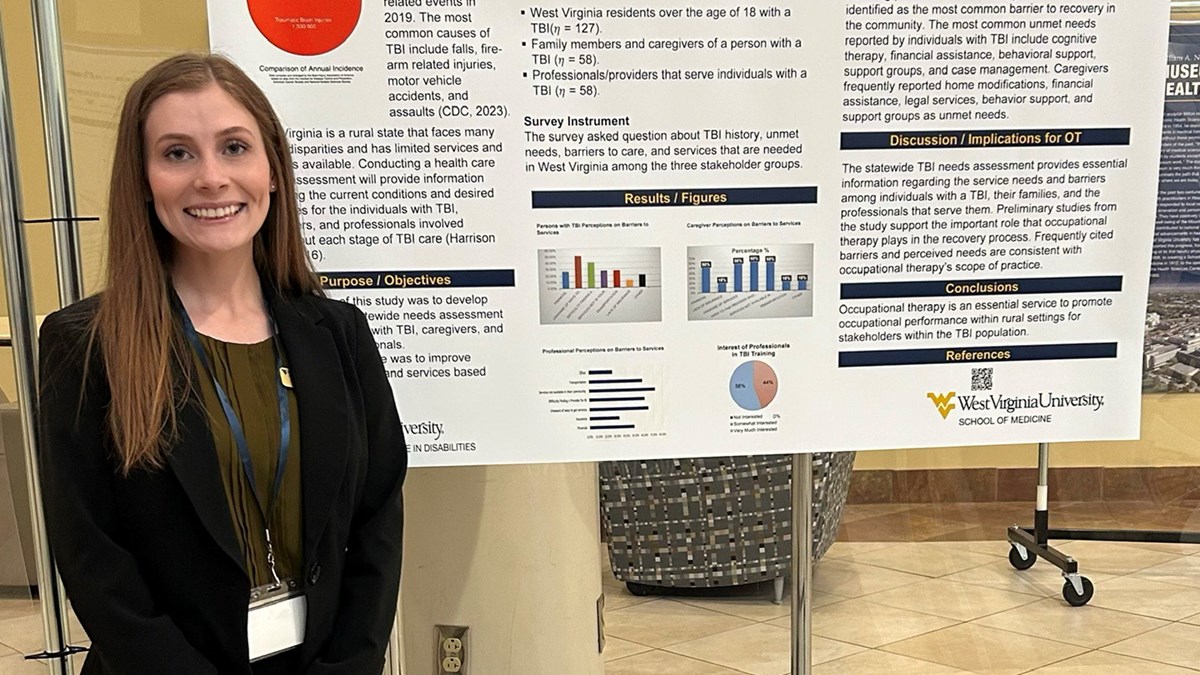Megan Bruce

“The WVU OTD curriculum provides many hands-on learning experiences that support students. My understanding of human anatomy was enhanced by the cadaver dissection lab’s use of lectures and hands-on activities that cater to a variety of learning styles.”
Why did you choose your current major or program?
My personal experiences as a sibling of someone with a neurodevelopmental disability have influenced my dedication to becoming a compassionate occupational therapist.
Why did you choose WVU for your education?
The Division of Occupational Therapy at WVU provides an abundance of resources and learning opportunities to support students in becoming competent occupational therapists.
What do you eventually want to do in your career? What’s the end goal? Are there any postgraduate degrees or programs you want to pursue?
My goal is to become an exceptional occupational therapist that provides compassionate and quality care to medically complex children and their families. I also plan to become certified in the use of hippotherapy as a treatment tool in my occupational therapy practice, as this will allow me to combine my love for horses and agriculture with my passion of supporting those with diverse needs.
Why do you feel this career will be rewarding and fits you uniquely?
Occupational therapy is a rewarding career, as it focuses on the restoration or development of functional independence in meaningful activities while utilizing a client-centered approach. OT enhances the health, well-being, and quality of life for the patients and families it serves. My ability to perceive situations through the lens of a family member of someone with complex needs supports me in being a compassionate, patient, and dedicated occupational therapist.
What would you tell a student who’s thinking about applying to your program?
WVU is an excellent institution that provides support and resources to help you achieve your goals. The school atmosphere, abundance of opportunities, and prestigious academics makes it a fantastic place to earn a degree in occupational therapy.
Does your program have any hands-on learning or internship opportunities that you’ve particularly enjoyed?
The WVU OTD curriculum provides many hands-on learning experiences that support students in becoming skilled therapists. My understanding of human anatomy was enhanced by the cadaver dissection lab’s use of lectures and hands-on activities that cater to a variety of learning styles. The Simulation Training and Education for Patient Safety Center has given me many opportunities to develop my skills to become a skilled occupational therapy practitioner and to experience collaboration with an inter-professional team during patient care. I have also had the opportunity to work as a graduate assistant on the WV Traumatic Brain Injury grant through the Center for Excellence in Disabilities, which has expanded my knowledge of brain injury and community-based healthcare programs.
Have you had any faculty that you particularly enjoyed in class or through mentorship, etc.?
The faculty within the Division of Occupational Therapy at WVU are dedicated to shaping the profession of OT by providing evidence-based and client-centered instruction to future practitioners. My research advisors, Dr. Amanda Acord-Vira, Dr. Steven Wheeler, and Dr. Heather Livengood have helped me expand my knowledge on traumatic brain injury through understanding the unmet needs of patients, families, and professionals regarding TBI in West Virginia, which has been an eye-opening experience.
Are you active in any clubs or extracurricular activities?
I am currently a member of the WVU Student Occupational Therapy Association and a member of the Health Sciences Student Advisory Board.
Tell us something unique or interesting about yourself that others may not know. Hobbies, talents, superlatives, etc.
I played on the WVU Women's Hockey team during my undergraduate education.